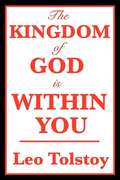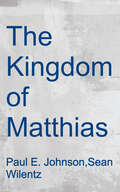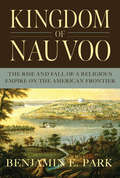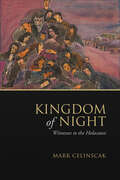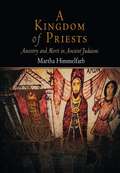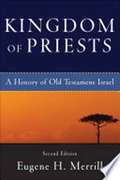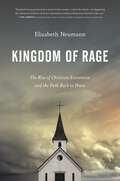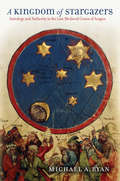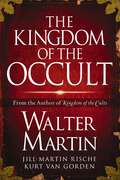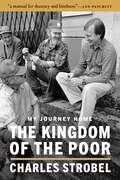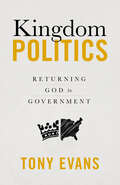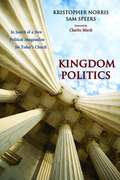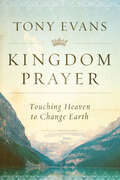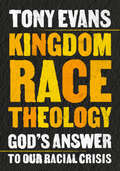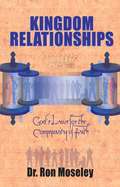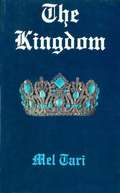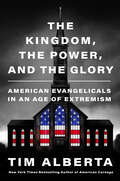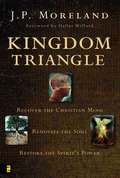- Table View
- List View
The Kingdom of God is Within You
by Leo TolstoyThe soul-searching book that inspired Gandhi to embrace the concept of passive resistance, Tolstoy's 1894 polemic outlines a radical, well-reasoned revision of traditional Christian thinking. The revered novelist and political thinker denounces violent revolution, calling upon readers to rely upon their inner divinity for the strength to effect social change.
The Kingdom of Matthias: A Story of Sex and Salvation in 19th-Century America
by Paul E. Johnson Sean WilentzIn the autumn of 1834, New York City was awash with rumors of a strange religious cult operating nearby, centered around a mysterious, self-styled prophet named Matthias. It was said that Matthias the Prophet was stealing money from one of his followers; then came reports of lascivious sexual relations, based on odd teachings of matched spirits, apostolic priesthoods, and the inferiority of women. At its climax, the rumors transformed into legal charges, as the Prophet was arrested for the murder of a once highly-regarded Christian gentleman who had fallen under his sway. <p><p>By the time the story played out, it became one of the nation's first penny-press sensations, casting a peculiar but revealing light on the sexual and spiritual tensions of the day. In The Kingdom of Matthias, the distinguished historians Paul Johnson and Sean Wilentz brilliantly recapture this forgotten story, imbuing their richly researched account with the dramatic force of a novel. In this book, the strange tale of Matthias the Prophet provides a fascinating window into the turbulent movements of the religious revival known as the Second Great Awakening--movements which swept up great numbers of evangelical Americans and gave rise to new sects like the Mormons. Into this teeming environment walked a down-and-out carpenter named Robert Matthews, who announced himself as Matthias, prophet of the God of the Jews. His hypnotic spell drew in a cast of unforgettable characters--the meekly devout businessman Elijah Pierson, who once tried to raise his late wife from the dead; the young attractive Christian couple, Benjamin Folger and his wife Ann (who seduced the woman-hating Prophet); and the shrewd ex-slave Isabella Van Wagenen, regarded by some as "the most wicked of the wicked." None was more colorful than the Prophet himself, a bearded, thundering tyrant who gathered his followers into an absolutist household, using their money to buy an elaborate, eccentric wardrobe, and reordering their marital relations. By the time the tensions within the kingdom exploded into a clash with the law, Matthias had become a national scandal. <p><p>In the hands of Johnson and Wilentz, the strange tale of the Prophet and his kingdom comes vividly to life, recalling scenes from recent experiences at Jonestown and Waco. They also reveal much about a formative period in American history, showing the connections among rapid economic change, sex and race relations, politics, popular culture, and the rich varieties of American religious experience.
Kingdom of Nauvoo: The Rise And Fall Of A Religious Empire On The American Frontier
by Benjamin E. ParkAn extraordinary story of faith and violence in nineteenth-century America, based on previously confidential documents from the Church of Jesus Christ of Latter-day Saints. Compared to the Puritans, Mormons have rarely gotten their due, treated as fringe cultists at best or marginalized as polygamists unworthy of serious examination at worst. In Kingdom of Nauvoo, the historian Benjamin E. Park excavates the brief life of a lost Mormon city, and in the process demonstrates that the Mormons are, in fact, essential to understanding American history writ large. Drawing on newly available sources from the LDS Church—sources that had been kept unseen in Church archives for 150 years—Park recreates one of the most dramatic episodes of the 19th century frontier. Founded in Western Illinois in 1839 by the Mormon prophet Joseph Smith and his followers, Nauvoo initially served as a haven from mob attacks the Mormons had endured in neighboring Missouri, where, in one incident, seventeen men, women, and children were massacred, and where the governor declared that all Mormons should be exterminated. In the relative safety of Nauvoo, situated on a hill and protected on three sides by the Mississippi River, the industrious Mormons quickly built a religious empire; at its peak, the city surpassed Chicago in population, with more than 12,000 inhabitants. The Mormons founded their own army, with Smith as its general; established their own courts; and went so far as to write their own constitution, in which they declared that there could be no separation of church and state, and that the world was to be ruled by Mormon priests. This experiment in religious utopia, however, began to unravel when gentiles in the countryside around Nauvoo heard rumors of a new Mormon marital practice. More than any previous work, Kingdom of Nauvoo pieces together the haphazard and surprising emergence of Mormon polygamy, and reveals that most Mormons were not participants themselves, though they too heard the rumors, which said that Joseph Smith and other married Church officials had been “sealed” to multiple women. Evidence of polygamy soon became undeniable, and non-Mormons reacted with horror, as did many Mormons—including Joseph Smith’s first wife, Emma Smith, a strong-willed woman who resisted the strictures of her deeply patriarchal community and attempted to save her Church, and family, even when it meant opposing her husband and prophet. A raucous, violent, character-driven story, Kingdom of Nauvoo raises many of the central questions of American history, and even serves as a parable for the American present. How far does religious freedom extend? Can religious and other minority groups survive in a democracy where the majority dictates the law of the land? The Mormons of Nauvoo, who initially believed in the promise of American democracy, would become its strongest critics. Throughout his absorbing chronicle, Park shows the many ways in which the Mormons were representative of their era, and in doing so elevates nineteenth century Mormon history into the American mainstream.
Kingdom of Night: Witnesses to the Holocaust
by Mark CelinscakIn April 1945, when the Bergen-Belsen concentration camp was surrendered and handed over to the British Army, Canadian forces arrived on scene to provide support, to bear witness, and to document the crimes. They were overwhelmed, understaffed, and left without adequate supplies, equipment, and medicine. Their encounters at the camp were haunting, transformative experiences that forever changed their lives. In Kingdom of Night, Mark Celinscak reveals the engagement of Canadian troops and other personnel at the Bergen-Belsen concentration camp. The book brings together a series of gripping, often deeply moving accounts that demonstrate the critical relief work carried out by Canadians who have been largely overlooked for more than seventy-five years. It outlines in both stark and moving detail what a cross-section of Canadians both said and did during the liberation efforts at one of the most notorious sites in Hitler’s camp system. In addition, biographical overviews are presented for each Canadian featured in the book, not only highlighting some of their life-saving and humanitarian work, but also revealing what ultimately became of their lives after the war. Kingdom of Night depicts the gruelling efforts by those who assisted the victims of one of the greatest crimes in history.
A Kingdom of Priests
by Martha HimmelfarbAccording to the account in the Book of Exodus, God addresses the children of Israel as they stand before Mt. Sinai with the words, "You shall be to me a kingdom of priests and a holy nation" (19:6). The sentence, Martha Himmelfarb observes, is paradoxical, for priests are by definition a minority, yet the meaning in context is clear: the entire people is holy. The words also point to some significant tensions in the biblical understanding of the people of Israel. If the entire people is holy, why does it need priests? If membership in both people and priesthood is a matter not of merit but of birth, how can either the people or its priests hope to be holy? How can one reconcile the distance between the honor due the priest and the actual behavior of some who filled the role? What can the people do to make itself truly a kingdom of priests?Himmelfarb argues that these questions become central in Second Temple Judaism. She considers a range of texts from this period, including the Book of Watchers, the Book of Jubilees, legal documents from the Dead Sea Scrolls, the writings of Philo of Alexandria, and the Book of Revelation of the New Testament, and goes on to explore rabbinic Judaism's emphasis on descent as the primary criterion for inclusion among the chosen people of Israel--a position, she contends, that took on new force in reaction to early Christian disparagement of the idea that mere descent from Abraham was sufficient for salvation.
Kingdom of Priests: A History of Old Testament Israel
by Eugene H. MerrillFrom the origins and exodus to the restoration and new hope, Kingdom of Priests offers a comprehensive introduction to the history of Old Testament Israel. Merrill explores the history of ancient Israel not only from Old Testament texts but also from the literary and archeological sources of the ancient Near East. After selling more than 30,000 copies, the book has now been updated and revised. The second edition addresses and interacts with current debates in the history of ancient Israel, offering an up-to-date articulation of a conservative evangelical position on historical matters. The text is accented with nearly twenty maps and charts.
Kingdom of Rage: The Rise of Christian Extremism and the Path Back to Peace
by Elizabeth NeumannA former counterterrorism official explores how modern evangelicalism and right-wing conservatism intermingled to form the combustible ideology that resulted in the January 6 attacks on the Capitol—and which threatens to destroy the American Church from within. How did a Church that purports to follow the teachings of Jesus - the Prince of Peace - become a breeding ground for violent extremism? When Elizabeth Neumann began her anti-terrorism career as part of President George W. Bush&’s Homeland Security Counsel in the wake of the September 11 attacks, she expected to spend her life protecting her country from the threat of global terrorism. But as her career evolved, she began to perceive that the greatest threat to American security came not from religious fundamentalists in Afghanistan or Iraq but from white nationalists and radicalized religious fundamentalists within the very institution that was closest to her heart – the American evangelical church. And she began to sound the alarm, raising her concerns to anyone in government who would listen, including testifying before Congress in February of 2020. At that time, Neumann warned that anti-Semitic and white supremacist terrorism was a transnational threat that was building to the doorstep of another major attack. Shortly after her testimony, she resigned from her role as Department of Homeland Security Assistant Secretary for Counterterrorism and Threat Prevention in protest of what she believed was then-President Trump&’s failure of leadership and his stoking of the hatred, anger, and division from which she had dedicated her life to protecting her country. Her worst fears came true when she witnessed the attack on the capital on January 6, 2021. In Kingdom of Rage, Neumann explores the forces within American society that have encouraged the radicalization of white supremacist, anti-government and other far-right terrorists by co-opting Christian symbols and culture and perverting the faith&’s teachings. While Neumann offers decades of insights into the role government policies can play to prevent further bloodshed, she believes real change must come from the within the Christian church. She shines a bright light on the responsibility of ordinary Americans – and particularly American Christians – to work within their families and their communities to counteract the narrative of victimization and marginalization within American evangelicalism. Her goal for this book is not only to sound a warning about one of the greatest threats to our security but to rescue the Church from the forces that will, if left unchecked, destroy it – culturally, morally, and ultimately quite literally. This is a book for anyone who wants to understand the unholy marriage of right-wing politics and Christian exceptionalism in America and who wants to be a part of reversing the current path towards division, hatred, violence and the ultimate undermining of both evangelical Christianity and American democracy.
A Kingdom of Stargazers: Astrology and Authority in the Late Medieval Crown of Aragon
by Michael A. RyanAstrology in the Middle Ages was considered a branch of the magical arts, one informed by Jewish and Muslim scientific knowledge in Muslim Spain. As such it was deeply troubling to some Church authorities. Using the stars and planets to divine the future ran counter to the orthodox Christian notion that human beings have free will, and some clerical authorities argued that it almost certainly entailed the summoning of spiritual forces considered diabolical. We know that occult beliefs and practices became widespread in the later Middle Ages, but there is much about the phenomenon that we do not understand. For instance, how deeply did occult beliefs penetrate courtly culture and what exactly did those in positions of power hope to gain by interacting with the occult? In A Kingdom of Stargazers, Michael A. Ryan examines the interest in astrology in the Iberian kingdom of Aragon, where ideas about magic and the occult were deeply intertwined with notions of power, authority, and providence. Ryan focuses on the reigns of Pere III (1336–1387) and his sons Joan I (1387–1395) and Martí I (1395–1410). Pere and Joan spent lavish amounts of money on astrological writings, and astrologers held great sway within their courts. When Martí I took the throne, however, he was determined to purge Joan’s courtiers and return to religious orthodoxy. As Ryan shows, the appeal of astrology to those in power was clear: predicting the future through divination was a valuable tool for addressing the extraordinary problems—political, religious, demographic—plaguing Europe in the fourteenth century. Meanwhile, the kings' contemporaries within the noble, ecclesiastical, and mercantile elite had their own reasons for wanting to know what the future held, but their engagement with the occult was directly related to the amount of power and authority the monarch exhibited and applied. A Kingdom of Stargazers joins a growing body of scholarship that explores the mixing of religious and magical ideas in the late Middle Ages.
The Kingdom of the Cults: An Analysis of the Major Cult Systems in the Present Christian Era
by Walter Ralston MartinUpdated regularly, this book continues to be a crucial tool in counter-cult ministry and evangelism for teachers and pastors as well as lay Christians.
The Kingdom of the Occult
by Walter Martin Jill Martin Rische Kevin RischeThe Kingdom of the Occult delivers the timely followup to Dr. Martin's best-selling The Kingdom of the CultsThis book takes Dr. Walter Martin's comprehensive knowledge and his dynamic teaching style and forges a strong weapon against the world of the Occult-a weapon of the same scope and power as his phenomenal thirty-five year bestseller, The Kingdom of the Cults (over 875,000 sold). Chapters include: Witchcraft and Wicca, Satanism, Pagan Religions, Tools of the Occult, Demon Possession and Exorcism, Spiritual Warfare, etc.Features include:Each chapter contains: Quick Facts; History; Case Studies; Theology; Resources
The Kingdom of the Poor: My Journey Home
by Charles StrobelAs Charles Strobel, beloved Nashville priest and champion of the unhoused, reached the end of his life in 2023, he began to contemplate the last message he wanted to leave his family, friends, and community. With the help of his niece, Katie Seigenthaler, and his colleague, Amy Frogge, Strobel began to dictate The Kingdom of the Poor. He wrote, &“Mark Twain, the great American folk hero and writer, has said, &‘The two most important days of your life are the day you are born and the day you find out why.&’ The following pages help to explain why I was born.&” The &“why&” of Charlie Strobel&’s life, which was devoted to helping those without support systems and homes to call their own, was a simple belief that we are all poor and we are all worthy of love.The Kingdom of the Poor is the story of the people and experiences that led him to this understanding and inspired him to live his life accordingly.
Kingdom Politics
by Tony EvansChristians love to talk about politics, but the current conversation is full of contentious words that divide our churches and families. Dr. Tony Evans takes a step back to find foundational Bible principles for integrating politics into our daily lives. He challenges readers to incorporate all of Scripture when addressing divisive issues, forcing us to look at political issues we&’ve neglected. Learn to speak with grace when you disagree with family and friends. Maintain your political affiliations without causing divisions in your church. Take sides on moral issues while demonstrating the compassion and love of Jesus Christ. Kingdom Politics offers a biblical path through one of the most divisive issues of our time.
Kingdom Politics
by Tony EvansChristians love to talk about politics, but the current conversation is full of contentious words that divide our churches and families. Dr. Tony Evans takes a step back to find foundational Bible principles for integrating politics into our daily lives. He challenges readers to incorporate all of Scripture when addressing divisive issues, forcing us to look at political issues we&’ve neglected. Learn to speak with grace when you disagree with family and friends. Maintain your political affiliations without causing divisions in your church. Take sides on moral issues while demonstrating the compassion and love of Jesus Christ. Kingdom Politics offers a biblical path through one of the most divisive issues of our time.
Kingdom Politics: In Search Of A New Political Imagination For Today's Church
by Kristopher Norris Sam SpeersAmerican Christians, weary of decades of entrenched partisan feuding, are increasingly distancing themselves from politics. Some, however, continue to turn toward the state and public policy to find solutions to the world's problems. The problem is that both responses allow a narrow vision of politics to determine the church's mission and ministries, which often ends up separating its commitment to personal faith from the pursuit of social justice--the King from the kingdom. Christians too easily forget that the church is inherently political, a community defined by its allegiance to a King, its citizenship in a new world, and its call to work alongside others in pursuit of a new way of life. The church needs a political vision that is more than blind acceptance or mere rejection of past models. It needs a positive vision that takes its cues about politics not from the nation-state but from another political reality: the kingdom of God. This book tells the stories of the visits of two researchers to five diverse congregations across the United States. From the megachurch energy of Rick Warren's Saddleback Church in California, to a young Emergent community in Minneapolis, to the politically active home of Martin Luther King in Atlanta, these stories illuminate the vastly different ways congregations understand and approach politics--and offer a glimpse of a new political imagination for today's church.
Kingdom Prayer: Touching Heaven to Change Earth
by Tony EvansIf you want to know the temperature of your spiritual life, look at the thermostat setting on your prayer life.Prayer is the most misunderstood and neglected aspect of the Christian life. It has been estimated that most Christians pray three to five minutes a day. Compare that to the time many spend complaining, and you&’ll gain insight into the spiritual and emotional condition of our day.Yet God has constructed the world in such a way that there is much He won&’t do in a Christian&’s life apart from prayer. Prayer, when combined with faith, can accomplish great things. In this practical and comprehensive overview of prayer, Tony Evans covers a variety of topics, including:Principles of productive prayer The power of prayer and praiseFasting and prayerPrayer and God's purposes Tony&’s expositions of various passages on prayer will help you realize its critical importance and encourage you to make it a dominant mark of your life.
Kingdom Prayer: Touching Heaven to Change Earth
by Tony EvansIf you want to know the temperature of your spiritual life, look at the thermostat setting on your prayer life.Prayer is the most misunderstood and neglected aspect of the Christian life. It has been estimated that most Christians pray three to five minutes a day. Compare that to the time many spend complaining, and you&’ll gain insight into the spiritual and emotional condition of our day.Yet God has constructed the world in such a way that there is much He won&’t do in a Christian&’s life apart from prayer. Prayer, when combined with faith, can accomplish great things. In this practical and comprehensive overview of prayer, Tony Evans covers a variety of topics, including:Principles of productive prayer The power of prayer and praiseFasting and prayerPrayer and God's purposes Tony&’s expositions of various passages on prayer will help you realize its critical importance and encourage you to make it a dominant mark of your life.
Kingdom Race Theology: God's Answer to Our Racial Crisis
by Tony EvansThe 2020 murder of George Floyd ignited a racial firestorm throughout America, provoking lament and grief over a long history of tragedy. The widespread protests gave way to a heated discussion about terms such as systemic racism, white privilege, and Critical Race Theory, all framed by the slogan &“black lives matter.&” The beginnings of a helpful dialogue on diversity became a heated battle, one that quickly spread to the church.Drawing on forty years of ministry experience, Tony Evans writes with a fearless and prophetic voice, probing to the heart of the issue and pointing to God&’s Word as the solution. Kingdom Race Theology helps people and churches commit to restitution, reconciliation, and responsibility. His penetrating and practical ideas will help pastors and church leaders sort through the conflicting theories, finding sensible solutions in the form of individual and collective action plans. Christians can work together across racial lines to repair the damage done by a long history of racial injustice.
Kingdom Race Theology: God's Answer to Our Racial Crisis
by Tony EvansThe 2020 murder of George Floyd ignited a racial firestorm throughout America, provoking lament and grief over a long history of tragedy. The widespread protests gave way to a heated discussion about terms such as systemic racism, white privilege, and Critical Race Theory, all framed by the slogan &“black lives matter.&” The beginnings of a helpful dialogue on diversity became a heated battle, one that quickly spread to the church.Drawing on forty years of ministry experience, Tony Evans writes with a fearless and prophetic voice, probing to the heart of the issue and pointing to God&’s Word as the solution. Kingdom Race Theology helps people and churches commit to restitution, reconciliation, and responsibility. His penetrating and practical ideas will help pastors and church leaders sort through the conflicting theories, finding sensible solutions in the form of individual and collective action plans. Christians can work together across racial lines to repair the damage done by a long history of racial injustice.
Kingdom Relationships: God’s Laws for the Community of Faith
by Dr Ron MoseleyHow does Torah (Law) bless believers in Messiah?
Kingdom, The
by Cliff Dudley Mel TariThe Kingdom could bring revival and restoration to the Church and individual lives. This book is power-packed and annointed. This is not a Kingdom Now theology book. In this book, Mel Tari gives us God's plan for that life in Christ. It comes through RESTORATION, REPENTANCE, RELATIONSHIP, AND REVELATION. Jesus Christ is returning soon and we - His Church - must prepare for the Great Day!
The Kingdom, the Power, and the Glory: American Evangelicals in an Age of Extremism
by Tim AlbertaThe award-winning journalist and staff writer for The Atlantic follows up his New York Times bestseller American Carnage with this timely, rigorously reported, and deeply personal examination of the divisions that threaten to destroy the American evangelical movement. <p><p> Evangelical Christians are perhaps the most polarizing—and least understood—people living in America today. In his seminal new book, The Kingdom, the Power, and the Glory, journalist Tim Alberta, himself a practicing Christian and the son of an evangelical pastor, paints an expansive and profoundly troubling portrait of the American evangelical movement. Through the eyes of televangelists and small-town preachers, celebrity revivalists and everyday churchgoers, Alberta tells the story of a faith cheapened by ephemeral fear, a promise corrupted by partisan subterfuge, and a reputation stained by perpetual scandal. <p><p> For millions of conservative Christians, America is their kingdom—a land set apart, a nation uniquely blessed, a people in special covenant with God. This love of country, however, has given way to right-wing nationalist fervor, a reckless blood-and-soil idolatry that trivializes the kingdom of Jesus Christ. Alberta retraces the arc of the modern evangelical movement, placing political and cultural inflection points in the context of church teachings and traditions, explaining how Donald Trump's presidency and the COVID-19 pandemic only accelerated historical trends that long pointed toward disaster. Reporting from half-empty sanctuaries and standing-room-only convention halls across the country, the author documents a growing fracture inside American Christianity and journeys with readers through this strange new environment in which loving your enemies is "woke" and owning the libs is the answer to WWJD. <p><p> Accessing the highest echelons of the American evangelical movement, Alberta investigates the ways in which conservative Christians have pursued, exercised, and often abused power in the name of securing this earthly kingdom. He highlights the battles evangelicals are fighting—and the weapons of their warfare—to demonstrate the disconnect from scripture: Contra the dictates of the New Testament, today's believers are struggling mightily against flesh and blood, eyes fixed on the here and now, desperate for a power that is frivolous and fleeting. Lingering at the intersection of real cultural displacement and perceived religious persecution, Alberta portrays a rapidly secularizing America that has come to distrust the evangelical church, and weaves together present-day narratives of individual pastors and their churches as they confront the twin challenges of lost status and diminished standing. <p><p> Sifting through the wreckage—pastors broken, congregations battered, believers losing their religion because of sex scandals and political schemes—Alberta asks: If the American evangelical movement has ceased to glorify God, what is its purpose? <p> <b>New York Times Bestseller</b>
Kingdom to Commune: Protestant Pacifist Culture between World War I and the Vietnam Era
by Patricia AppelbaumAmerican religious pacifism is usually explained in terms of its practitioners' ethical and philosophical commitments. Patricia Appelbaum argues that Protestant pacifism, which constituted the religious center of the large-scale peace movement in the United States after World War I, is best understood as a culture that developed dynamically in the broader context of American religious, historical, and social currents. Exploring piety, practice, and material religion, Appelbaum describes a surprisingly complex culture of Protestant pacifism expressed through social networks, iconography, vernacular theology, individual spiritual practice, storytelling, identity rituals, and cooperative living. Between World War I and the Vietnam War, she contends, a paradigm shift took place in the Protestant pacifist movement. Pacifism moved from a mainstream position to a sectarian and marginal one, from an embrace of modernity to skepticism about it, and from a Christian center to a purely pacifist one, with an informal, flexible theology. The book begins and ends with biographical profiles of two very different pacifists, Harold Gray and Marjorie Swann. Their stories distill the changing religious culture of American pacifism revealed inKingdom to Commune.
Kingdom Triangle
by J. P. MorelandWestern society is in crisis, the result of our culture's embrace of naturalism and postmodernism. At the same time, the biblical worldview has been pushed to the margins. Christians have been strongly influenced by these trends, with the result that the personal lives of Christians often reflect the surrounding culture more than the way of Christ, and the church's transforming influence on society has waned. In Kingdom Triangle, J. P. Moreland issues a call to recapture the drama and power of kingdom living. He examines and provides a penetrating critique of these worldviews and shows how they have ushered in the current societal crisis. He then lays out a strategy for the Christian community to regain the potency of kingdom life and influence in the world. Drawing insights from the early church, he outlines three essential ingredients of this revolution: ? Recovery of the Christian mind ? Renovation of Christian spirituality ? Restoration of the power of the Holy Spirit He believes that evangelical Christianity can mature and lead the surrounding society out of the meaningless morass it finds itself in with humility and vision.
Kingdom Triangle: Recover the Christian Mind, Renovate the Soul, Restore the Spirit's Power
by J. P. MorelandWestern society is in crisis, the result of our culture's embrace of naturalism and postmodernism. At the same time, the biblical worldview has been pushed to the margins. Christians have been strongly influenced by these trends, with the result that the personal lives of Christians often reflect the surrounding culture more than the way of Christ, and the church's transforming influence on society has waned. In Kingdom Triangle, J.P. Moreland issues a call to recapture the drama and power of kingdom living. He examines and provides a penetrating critique of these worldviews and shows how they have ushered in the current societal crisis. He then lays out a strategy for the Christian community to regain the potency of kingdom life and influence in the world. Drawing insights from the early church, he outlines three essential ingredients of this revolution: ? Recovery of the Christian mind ? Renovation of Christian spirituality ? Restoration of the power of the Holy Spirit He believes that evangelical Christianity can mature and lead the surrounding society out of the meaningless morass it finds itself in with humility and vision.
Kingdom Triangle: Recover the Christian Mind, Renovate the Soul, Restore the Spirit's Power
by J. P. MorelandJ.P. Moreland—Christian philosopher, theologian, and apologist—issues a call to recapture the drama and power of kingdom living—to cultivate a revolution of Evangelical life, spirituality, thought, and Spirit-led power.Drawing insights from the early church, he unpacks three essential ingredients of this revolution:Recovery of the Christian mind.Renovation of Christian spirituality.Restoration of the power of the Holy Spirit.Western society is in crisis: the result of our culture's embrace of naturalism and postmodernism, and a biblical worldview has been pushed to the margins. Christians have been strongly influenced by these trends, with the result that their personal lives often reflect the surrounding culture more than the way of Christ, and the church's transforming influence on society has waned as a result.Kingdom Triangle is divided into two major sections:The first examines and provides a critique of secular worldviews and shows how they have ushered in the current societal crisis.The second lays out a strategy for the Christian community to regain the potency of kingdom life and influence in the world.Moreland believes that evangelical Christianity can mature and lead the surrounding society out of the meaningless morass it finds itself in with humility and vision. With clear insight, he puts the thoughtful Christian in a position to understand our current cultural struggle and to return to a responsible presentation of "the way of Christ" as not just a way of right living, but also a way of knowledge and meaningful life.
